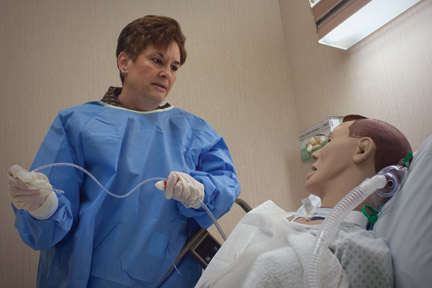The Newman University School of Nursing and Allied Health was recently awarded a highly competitive $30,000 grant from the Via Christi Foundation and Children’s Miracle Network to expand simulation technology within its nursing and allied health programs. The simulations will help provide preparation and evaluation for students in the university’s traditional baccalaureate of nursing program, graduate level nurse anesthesia program, and associate level respiratory therapy program.
The simulation equipment will include medical manikins that mimic realistic situations found in the healthcare environment. Students are given a variety of situations, and are evaluated based on their ability to react accordingly. The professor has the ability to adjust the simulation testing to the skill level of the student allowing for greater improvement.
By adding simulation into Newman’s nursing and allied health curriculum, students will obtain more realistic, clinical experiences outside of the hospital setting.

“Although our students benefit from excellent clinical experiences, simulation provides a safe and effective tool for educating today’s healthcare professional,” stated Bernadette Fetterolf, Ph.D., Newman associate dean of Nursing and Allied Health and co-author of the grant. “We currently utilize a beginning level of simulation experience, but the new addition of high fidelity simulators will augment the student’s current experiences,” said Fetterolf.
Fetterolf added that the ability to safely control and isolate clinical problems to facilitate student learning is not possible in today’s healthcare environment. Time is often a restriction in the hospital setting. Nurses must act promptly and efficiently to effectively care for the patient. This prior skill and practice is crucial in the success of healthcare professionals. The use of simulation allows for greater flexibility in processing information and practicing situations, thereby enhancing the student’s knowledge and experience upon graduation.
Simulation has also been shown to help students engage in collaborative teamwork and practice critical thinking and problem solving. It allows students to gather and process data, make decisions on what they should do and how it should be done, and allows for proper evaluation on the actions taken.
“Programs that have incorporated the new technology have noticed an increased competency in achievement with both the individuals and the program as a whole,” stated Anne Chandler, Newman director of Corporate and Foundation Relations and co-author of the grant. “It allows students to build confidence as well as track records of success, and it takes the feeling of patients being a guinea pig out of the equation. We are completely thrilled upon receiving such a contribution, and this will really allow our students to grow in their education here at Newman.”
.
.
